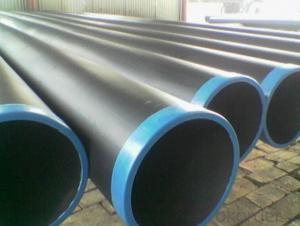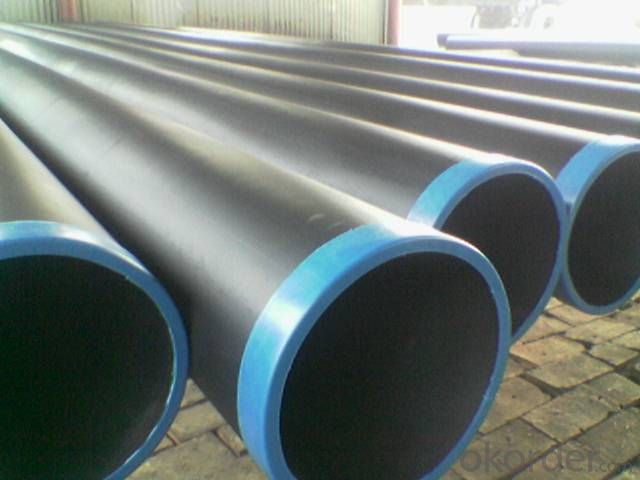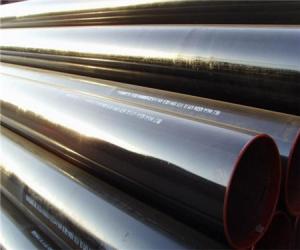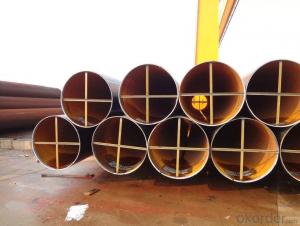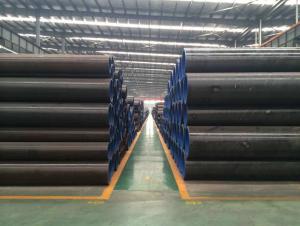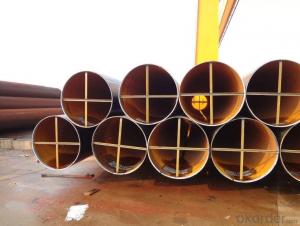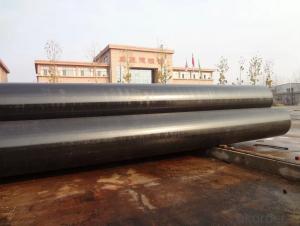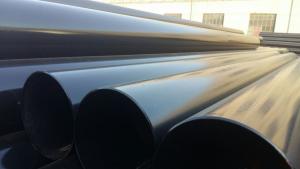Longitudinal Submerged Arc Welded Pipe
- Loading Port:
- China Main Port
- Payment Terms:
- TT or LC
- Min Order Qty:
- -
- Supply Capability:
- -
OKorder Service Pledge
OKorder Financial Service
You Might Also Like
1、Structure of Welded Steel Tube:
Welded Steel Tube is formed by drawing a solid billet over a piercing rod to create the hollow shell. We are company that have many years experience and professional manager team and engineer team and sales team, sure we will provide you high quality of welded pipe and professioanl service.
2、Main Features of the Welded Steel Tube:
• High manufacturing accuracy
• The higher strength
• The small inertia resistance
• Strong heat dissipation ability
• Good visual effect
• Satisfy price
3、Welded Steel Tube Specification:
Standard | GB, DIN, ASTM ASTM A106-2006, ASTM A53-2007 |
Grade | 10#-45#, 16Mn 10#, 20#, 45#, 16Mn |
Thickness | 8 - 33 mm |
Section Shape | Round |
Outer Diameter | 133 - 219 mm |
Place of Origin | Shandong, China (Mainland) |
Secondary Or Not | Non-secondary |
Application | Hydraulic Pipe |
Technique | Cold Drawn |
Certification | API |
Surface Treatment | factory state or painted black |
Special Pipe | API Pipe |
Alloy Or Not | Non-alloy |
Length | 5-12M |
Outer Diameter | 21.3-610mm |
Grade | 20#, 45#, Q345, API J55, API K55, API L80, API N80, API P110, A53B |
Standard | ASME, ASTM |
1) Material:20#(ASTM A 106/A53 GRB.API5LGRB,GB),45#,16Mn,10#.
2) Specification range:OD:21.3-610mm,WT:6-70mm,length:6-12m or according to the requirement of clients.
3) Excutive standards:GB,ASME API5L.ASTM A 106/A53,Despite of the above standards,we can also supply seamless steel pipe with standard of DIN,JIS,and so on,and also develop new products according to the requirements of our clients!
4) Surface:black lacquered,varnish coating or galvanized.
5) Ends:Beveled or square cut,plastic capped,painted.
6) Packing:bundles wrapped with strong steel strip,seaworthy packing.
4、Packaging & Delivery
Packaging Details: | seaworthy package,bundles wrapped with strong steel strip |
Delivery Detail: | 15-30days after received 30%TT |
5、FAQ of Welded Steel Tube:
①How is the quality of your products?
Our products are strictly in accordance with international and domestic standard. We test on every pipe before delivery. Any quality certification or testing report you want to see, please tell us.
Guaranteed: If products’ quality is not in accordance with description as we provide or the promise before you place order, we promise 100% refund.
②How about the price?
Yes, we are factory and be capable of offering you the lowest price. One of our policy is that “ to save time and be absolutely honest with our business relationship, we quote as low as possible for every client, and discount can be given according to the quantity”, if you are interested in bargain and dissatisfy our factory price, just don’t waste your time. Our quotation is professional.
③Why should you choose us?
Choice happens because of our quality and price. Additionally, we can also offer professional products inquiry, products knowledge train (for agents), fast goods delivery, outstanding customer solution proposals. Our service formula: good quality + good price + good service=customer’s trust.
SGS test is available. Customer inspection before shipping is welcome. Third party inspection is OK.
6、 Welded Steel Tube Images:
- Q: What is the role of steel pipes in the mining and extraction of minerals?
- Steel pipes play a crucial role in the mining and extraction of minerals. They are widely used in various mining operations to transport water, slurry, and other fluids, as well as to provide structural support and ventilation in underground mines. One of the primary uses of steel pipes in mining is for transporting water or slurry. Water is essential in the mining process for various purposes, such as dust suppression, ore processing, and site rehabilitation. Steel pipes are used to create a network of pipelines that transport water from a source, such as a dam or reservoir, to different areas within the mine site. Similarly, slurry, a mixture of water and crushed minerals, is often transported through steel pipes to processing plants or tailings dams. Steel pipes also play a critical role in providing structural support in underground mines. Underground mining operations require tunnels and shafts to access valuable mineral deposits. These tunnels and shafts need to be reinforced to withstand the immense pressure exerted by the surrounding rock and prevent collapses. Steel pipes are used as support structures, such as roof bolts and rock bolts, to reinforce the walls and roofs of these underground excavations, ensuring the safety of miners and the stability of the mine structure. Additionally, steel pipes are used for ventilation systems in underground mines. Proper ventilation is vital in mining to ensure a constant supply of fresh air, remove harmful gases, and control temperature and humidity levels. Steel pipes are used to create ventilation shafts and ducts that facilitate the flow of air throughout the mine. This helps maintain a safe and healthy working environment for miners by preventing the buildup of toxic gases, dust, and heat. In summary, steel pipes are indispensable in the mining and extraction of minerals. They are used for transporting water, slurry, and other fluids, providing structural support in underground mines, and facilitating ventilation systems. Without steel pipes, the efficient and safe extraction of minerals from mines would be significantly hindered.
- Q: What are the different coatings used on steel pipes?
- There are several different coatings used on steel pipes, including but not limited to epoxy coatings, polyethylene coatings, zinc coatings, and galvanized coatings.
- Q: How are steel pipes used in the construction of stormwater drainage systems?
- Steel pipes are commonly used in the construction of stormwater drainage systems due to their durability and strength. These pipes are used to convey stormwater from various sources, such as streets and rooftops, to designated discharge points, preventing flooding and directing the water away from structures. Steel pipes are ideal for handling the high flow rates and heavy loads associated with stormwater runoff, making them an essential component in the construction of efficient and reliable drainage systems.
- Q: Can steel pipes be used for underground fire sprinkler systems?
- Yes, steel pipes can be used for underground fire sprinkler systems. Steel pipes are commonly used for their strength and durability, making them suitable for underground installations. However, it is important to ensure that the steel pipes are properly coated or protected against corrosion to maintain their integrity over time.
- Q: What are the factors to consider when selecting pipe materials for high-temperature applications?
- When selecting pipe materials for high-temperature applications, it is important to consider factors such as the maximum operating temperature, corrosion resistance, thermal expansion properties, mechanical strength, and cost. The chosen material should be able to withstand the anticipated temperature without deformation or degradation, resist corrosion from the process fluid or environment, have a low coefficient of thermal expansion to minimize stress on the pipe, possess sufficient mechanical strength to handle the pressure and load, and be cost-effective for the specific application.
- Q: How are steel pipes connected or joined together?
- Steel pipes are typically connected or joined together using various methods such as welding, threading, flanges, or couplings.
- Q: How do you calculate the pipe flow rate for steel pipes?
- In order to calculate the flow rate of steel pipes, one must take into account various factors. Initially, the inside diameter of the pipe, which is commonly represented as D, needs to be determined. Subsequently, the length of the pipe, denoted as L, should be measured. Furthermore, one must be aware of the pressure drop, ΔP, across the pipe and the density of the fluid, ρ. Once all this information is obtained, either the Darcy-Weisbach equation or the Hazen-Williams equation can be utilized to calculate the flow rate. The Darcy-Weisbach equation is typically employed for pipes with turbulent flow, whereas the Hazen-Williams equation is commonly used for pipes with laminar flow. For the Darcy-Weisbach equation, the formula is as follows: Q = (π/4) * D^2 * √(2ΔP/ρ) Here, Q denotes the flow rate in cubic meters per second, D represents the inside diameter of the pipe in meters, ΔP signifies the pressure drop across the pipe in pascals, and ρ stands for the fluid density in kilograms per cubic meter. On the other hand, for the Hazen-Williams equation, the formula is as follows: Q = C * (D^2.63) * (ΔP^0.54) * (L^0.63) In this case, Q represents the flow rate in cubic meters per second, D denotes the inside diameter of the pipe in meters, ΔP signifies the pressure drop across the pipe in pascals, L represents the length of the pipe in meters, and C represents the Hazen-Williams coefficient, which relies on the roughness of the pipe. To ensure an accurate calculation of the pipe flow rate, it is imperative to maintain consistent units of measurement throughout the calculation. Additionally, precise measurements of the inside diameter, length, pressure drop, and fluid density are crucial in obtaining reliable results.
- Q: What are the different methods of pipe support for steel pipes?
- Various methods exist for supporting steel pipes, each aimed at guaranteeing pipe stability, alignment, and protection. Some frequently employed techniques are as follows: 1. Pipe Hangers: These devices suspend or bear the weight of the pipe from above. Typically crafted from metal, they can be adjustable or fixed, allowing for easy installation and maintenance. Depending on the application, pipe hangers can take the form of clevis hangers, beam clamps, or pipe rollers. 2. Pipe Shoes: These supports attach directly to the underside of the pipe, providing a stable resting surface. Usually made from steel or other durable materials, pipe shoes prevent pipe movement, absorb vibrations, and distribute weight evenly. They find common use in applications involving high temperatures or requiring thermal expansion. 3. Pipe Clamps: These devices fasten pipes together or secure them to structures. Constructed primarily of metal, pipe clamps come in various sizes and designs to accommodate different pipe diameters and configurations. They provide support and prevent sagging or movement, particularly in areas with directional or elevation changes. 4. Pipe Racks: These structures are custom-designed to support multiple pipes in an organized and secure manner. Commonly found in industrial settings like refineries or power plants, pipe racks store or support large quantities of pipes. Typically made of steel, they can be tailored to suit different pipe sizes and layouts. 5. Pipe Guides: These devices facilitate pipe movement control, especially during thermal expansion or contraction. Fixed to the structure, pipe guides offer a sliding surface that accommodates longitudinal pipe movement. They are frequently utilized in applications involving temperature variations, such as steam or hot water systems. These represent just a few examples of the numerous methods available for supporting steel pipes. The choice of support method depends on factors such as pipe size, weight, temperature, and specific application requirements. Selecting the appropriate support method is crucial to ensure pipe longevity and integrity while preventing issues like sagging, misalignment, or failure.
- Q: Are steel pipes suitable for underground nuclear waste storage?
- Yes, steel pipes are suitable for underground nuclear waste storage. Steel pipes are known for their durability, strength, and resistance to corrosion, making them an ideal choice for safely containing and transporting nuclear waste underground. Additionally, steel pipes can withstand the high pressures and temperatures associated with nuclear waste, ensuring the integrity of the storage system.
- Q: Are steel pipes resistant to fire?
- Yes, steel pipes are highly resistant to fire.
Send your message to us
Longitudinal Submerged Arc Welded Pipe
- Loading Port:
- China Main Port
- Payment Terms:
- TT or LC
- Min Order Qty:
- -
- Supply Capability:
- -
OKorder Service Pledge
OKorder Financial Service
Similar products
Hot products
Hot Searches
Related keywords
